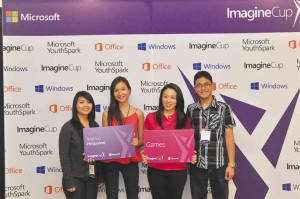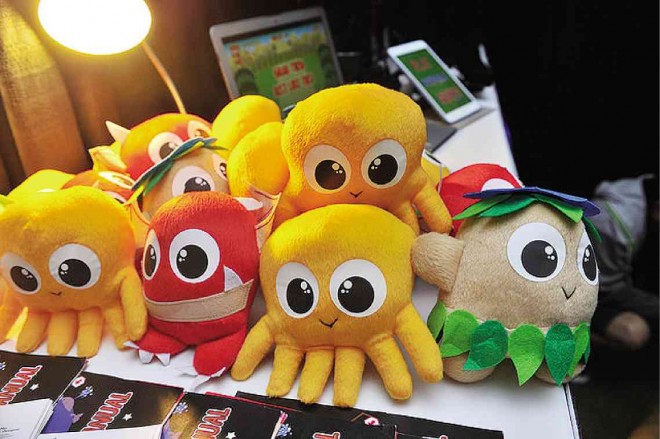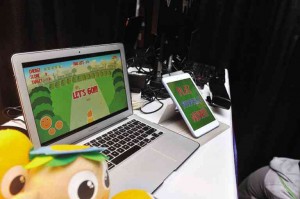‘Imagine Cup is our Olympics’
Fitpals is an Xbox Kinect game for children 4 to 7 years old. It requires players to move as they are playing instead of just remaining seated with eyes glued to the screen and a hand on the mouse, joystick or remote control.
It’s an adventure that allows kids to do basic exercises and acquire basic learning skills as they journey through the land of Fitverse in the company of cute characters.
The game’s developers—collectively known as Team Animus—are Patricia Alonzo, Flerizza Sanidad, Charlene Ho and Juan Miguel Maningo. All four are information systems (IS) majors at De La Salle-College of St. Benilde (CSB). All four know how to code but they are not hard-core programmers. Not yet anyway.
Here’s the best part: All four had the opportunity to compete in the Games category of the Imagine Cup World Finals that were held in Seattle, Washington, just a few weeks ago.
“This is so awesome,” Alonzo said, trying to talk above the din and excitement at Seattle Convention Center. “This is like our Olympics.”
Olympian’s welcome
That was the morning of the championship and awarding ceremonies. An honest-to-goodness marching band and a cheering audience composed of Microsoft employees, suppliers, student partners, media and compatriots gave the teams of students from 34 countries a grand welcome.
Trish Alonzo is right. The Imagine Cup is the Olympics for the mind. Microsoft has been hosting the global technology competition every year for 13 years now to inspire college students in all kinds of discipline to come up with amazing applications, games and solutions to solve all kinds of problems in the world.
It was Ebenezer “Ben” Uy, chair of CSB’s information technology department, who showed them the way to Seattle. He encouraged the students in his basic programming class to form a team so they could join the Microsoft challenge, just as he did in 2012 when a Philippine team qualified in the Imagine Cup in Sydney, Australia.
Team Animus was formed in November last year. The Christmas holiday break came and went. Upon their return to class, Uy asked about the status of their project. They had done nothing.
As it happened, the team needed to submit a video about their project before they could even qualify in the local Imagine Cup competition. That prompted its members to get together and figure something out. Seriously.
With Uy’s goading, they agreed on a fitness peg for the application they would be creating. They also narrowed down their target market to kids. Now at least they had a concept to work on.
What technology tools would they have to use to develop their project? They would definitely have to be by Microsoft. The team chose to use Windows, of course, a software developing kit called Kinect for Windows, Visual Studio and Facebook API.
Stepping up
“I didn’t know how to program in Kinect,” said JM Maningo, the only male in the group. While that might have been the case, he stepped up to the role of main programmer anyway. He learned how to code in sixth grade and all through high school at Don Bosco.
“We all know how to program but technology is constantly evolving,” he said. New programs and kits are introduced every so often that it is hard to keep up. “I had to learn Kinect. The girls also didn’t know about graphic design. They had to teach themselves.”
Charlene Ho, a graduating IS student and already a Microsoft student partner (MSP), assisted in coding inasmuch as she had the experience. “We’re always working on apps in the Microsoft office. You have to know how to program to be an MSP. You also must have good communication skills because you are considered an ambassador of Microsoft.”

SLEEPLESS in Seattle yet feeling awesome, Fitpals Rizzi Sanidad, Charlene Ho, Trish Alonzo and JM Maningo at the Imagine Cup World Finals
“I like it that if you write a few lines of code, you can make something happen on the screen,” said Maningo. To him, coding is comparable to composing music. He loves music and sings in a choir.
Rizzi Sanidad, another team member, is also into music. She plays the guitar. She even had a band in high school. That was in Saudi Arabia, where her parents reside and work as accountants.
It was Sanidad who created most of the graphics and the animation with the use of Adobe Illustrator, Adobe Photoshop and Adobe After Effects. She and Alonzo have been classmates and friends at CSB. They have become closer while working on the project, as Alonzo helped her with the design.
Hard-core gamers
Luckily, both Maningo and Sanidad are hard-core gamers familiar with game applications.
A good game app, said Maningo, would depend on graphics, the level of design, the art direction, the sound, the story line, etc. “In programming, you integrate all these elements.”
The team started working hard together in January so they would have a project to enter into the local Microsoft contest. It was almost finals week at CSB when they found out that they had qualified for the national Imagine Cup that was going to be held in April.
They thought it would be ideal if they could stay together in one place so they could work on their project every chance they got. Luckily, Alonzo’s parents had a condo in Taguig City that they allowed the team to use.
“Personality-wise we didn’t have any problems living together, but time management was hard,” Ho said.
On school days, Alonzo would drive everyone to and from CSB. Since the four of them had different class schedules, Alonzo either had to wait for the others or they had to wait for her. Eventually she taught Ho how to drive.
After their final exams, it was Holy Week but instead of going on vacation with their respective families, the quartet chose to spend the week in the condo to improve on their project.
“We would work on the app nonstop and then at midnight one of us would say stop and we’d all stop and get some sleep,” Alonzo said.
The time-pressed techies brought their dirty clothes home because there was hardly a chance to do laundry. Although their parents brought them food, sometimes the girls had to cook. Even for Maningo, who had become like a brother to them.
Think parent
“I thought we should probably integrate something for the parents into the app,” Alonzo said. She recalled that her mom was always checking on what games she and her brother were playing. Animus thus designed Fitpals so it would give feedback to parents—via Windows Phone—on how many calories the child is burning and how long the child has been playing.
On April 24, the contest finals were held in Intramuros. The Animus girls showed up in terno; the lone guy wore a barong Tagalog.
All four said that going into the competition, they didn’t think they would win at all. The other schools had formed their teams and worked on their projects earlier. Instead of competing separately, Ateneo de Manila University and the University of the Philippines did a mash-up and sent one powerhouse team. De La Salle University had even endorsed its team, which meant full support, something that the fledgling Animus had needed badly, although, according to Sanidad, “our parents were super supportive.”
As it turned out, the technology gods were quite discerning. Underdog Team Animus won the national title, along with a cash prize of P50,000 plus the right to compete in the regional Imagine Cup.
Nearing the end of April, the group was asked to submit their project online for the regionals. When Alonzo got a text message from Uy that they won the Games category in the regional competitions, she sent her teammates a text message but cautioned them to keep mum about it until they had checked the results online.
They had dined out as a team when they won the Philippine leg of the competition. “When we won in the regionals, we decided it was time to introduce our parents to one another,” Alonzo said. “We had a potluck.”
From fitness to education
The Asia-Pacific judges had suggested adding an educational component to Fitpals.
“We thought it was a great idea,” Ho said. “So instead of just having a lot of physical activity, like in a fitness video, we added the numbers and the alphabet.”
Alonzo asked kindergarten teachers from her old school for help in integrating the letter, number, color, fruit and animal recognition features into the game. What started out as a fitness program had become an educational fitness game. The team wants to sell Fitpals as an Xbox game (contact: teamanimus @outlook.com).
“I thought we could also market the characters as soft toys,” she said so she had samples of the Fitpal characters made into plush toys. True enough, the toys were a hit with the kids who tried out the game at the Museum of History and Industry on the last day of the Imagine Cup in Seattle.
“We did not even expect to pass the preliminaries but we are here now so we must have done something right,” Maningo said, as he was setting up for the museum presentation.
All four said they would like to still hang out together even after the Imagine Cup.
Not BFFs, but Fitpals forever. —Chelo Banal-Formoso
















